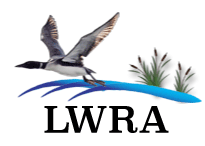Mosquito Control: Is It Safe?
by Caroline Konarzewski, with input from George Anderson and Mike Peppard
Lake of Bays Association News Flash
June 10, 2022
Much anticipated springtime has arrived. Trilliums bloom, leaf buds swell and burst into green, birds return from their winter retreat—and then the bugs! Blackflies and mosquitoes can wreak havoc on outdoor life, particularly in cottage country.
Some people use mosquito control “fogging” services, or DIY products, to control bugs on their property. Usually these are liquid-based products that are sprayed on targeted, high-mosquito-risk areas of their property. Common products used for fogging are concentrated garlic oil, and natural or synthetic pyrethrin, called pyrethroids. Multiple scientific studies show that synthetic pyrethroids, often called chrysanthemum oil making them sound natural, are chemically designed to be more toxic with lower breakdown times and are formulated with synergists increasing potency and compromising the body’s ability to detoxify the pesticide.
Here are some facts about pyrethrin and pyrethroids:
Highly toxic to insects and used to control mosquitoes, fleas, moths, flies and ants.
Highly toxic to honeybees, butterflies, dragonflies and all arthropods.
Toxic to bird food supply.
Highly toxic to fish and aquatic insects.
Can enter lake water from soil through erosion and drift.
Low potential to move to groundwater.
Break down quickly in soil and water in the presence of sunlight; but break down more slowly in the absence of sunlight.
Do not dissolve in water and tend to bind to sediment.
Low toxicity to humans and other mammals.
Infants, children, the elderly and people with sensitive skin and lung disorders are more vulnerable.
Direct exposure to skin can cause irritation, numbness and tingling at site of contact.
Direct exposure to eyes can cause irritation, blurred vision, tearing, itchiness.
When inhaled, can cause symptoms of irritation of the respiratory system, runny nose, coughing, and difficulty breathing.
Please consider the following alternative solutions for mosquito control:
Plant insect repelling plants like citronella, lavender, garlic, lemon grass, rosemary, basil, catnip, marigolds and petunias around your property.
Eliminate any standing water (even tiny amounts) to prevent mosquitoes from laying their eggs.
Use window and door screens to block mosquitoes from entering your home, cottage or workplace.
Use EPA (Environmental Protection Agency) registered insect repellents to avoid being bitten. EPA-registered means the product works and is safe when you follow the directions.
Dress in light-colored clothing, long pants, and long sleeves and try to avoid areas where mosquitoes are present.
Keeping in mind that information on toxicity in humans or on other insects such as caddisflies and dragonflies is unknown, garlic spray could be considered, as it is less harmful than pyrethroids.
Bacillus thuringiensis subspecies israelensis, commonly referred to as B.t.i., is a bacterium found naturally in soils and is harmless to humans, mammals, birds, reptiles and amphibians. Since 1982, it has been used successfully worldwide as a biological pest control agent to combat mosquitoes and black flies. For example, the product Mosquito Dunk® uses B.t.i. and looks like a small, beige donut which floats on standing water. As the Dunk® slowly dissolves, it releases a bacterium which destroys the guts of black fly and mosquito larvae.
Perhaps it would be best to simply embrace outdoor life in Muskoka—bugs and all. But if you can’t stand the mosquitoes, please do your research, ask questions and use products with the least negative impacts on human and environmental health.
For more information, click on the links below

